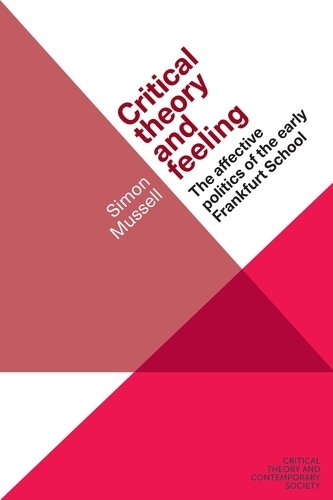
Critical Theory and Feeling: The Affective Politics of the Early Frankfurt School
(Paperback)
Available Formats
Publishing Details
Critical Theory and Feeling: The Affective Politics of the Early Frankfurt School
By (Author) Simon Mussell
Manchester University Press
Manchester University Press
6th July 2021
United Kingdom
Classifications
Tertiary Education
Non Fiction
Western philosophy from c 1800
Social and political philosophy
301.01
Physical Properties
Paperback
168
Width 156mm, Height 234mm, Spine 9mm
245g
Description
This book offers a unique and timely reading of the early Frankfurt School in response to the recent 'affective turn' within the arts and humanities. Resisting the overly rationalist tendencies of political philosophy, it argues that critical theory actively cultivates a powerful connection between thinking and feeling, and rediscovers a range of often neglected concepts that were of vital importance to the first generation of critical theorists, including melancholia, hope, (un)happiness, objects and mimesis. In doing so, it brings the dynamic work of Walter Benjamin, Theodor Adorno, Ernst Bloch and Siegfried Kracauer into conversation with more recent debates around politics and affect. An important intervention in the fields of affect studies and social and political thought, Critical theory and feeling shows that sensuous experience is at the heart of the Frankfurt School's affective politics.
Reviews
'From new materialism to affect theory to object-oriented ontology/speculative realism, the Frankfurt School and critical theory have seldom been swept up into their escape velocities. Simon Mussells book strikes like a force of gravity, a dialectical rebalancing that sturdies ones feet before launch, rekindling the historical-materialist engines that drive critiques politics to a full head of steam, shaking off whatever dust presumably clings to the Frankfurt School in order to show how emerging thought can always shudder in its orbit.'
Gregory J. Seigworth, Professor of Communication Studies, Millersville University
In a Brexit, Trump and post-truth world, Simon Mussell gives us first-generation critical theory tools to think through the emotional politics and political emotions of contemporary discontent. Chapters focused on hope, conscious un/happiness, and entanglement of human beings, capital and objects create a persuasive case for understanding the centrality of feelings in and for progressive social change.
Catherine Lane West-Newman, Senior Lecturer in Sociology and Criminology, University of Auckland
Author Bio
Simon Mussell is an independent researcher and editor
